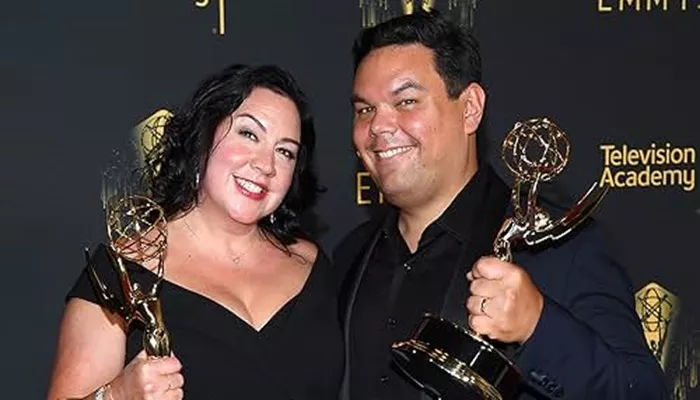WandaVision was Marvel Studios’ first venture into episodic television, premiering on Disney+ in January 2021. Created by Jac Schaeffer and directed by Matt Shakman, the series took a bold, genre-blending approach to storytelling. Starring Elizabeth Olsen as Wanda Maximoff and Paul Bettany as Vision, the show bridged classic sitcom styles with the broader Marvel Cinematic Universe (MCU).
Its experimental format and emotional depth set it apart from previous superhero stories. The show paid homage to American sitcoms from the 1950s through the early 2000s while gradually revealing a darker, more tragic narrative. This daring execution caught the attention of both fans and critics alike, positioning WandaVision as a standout contender in that year’s television awards circuit.
Critical Acclaim and Cultural Impact
Upon its release, WandaVision quickly became a cultural phenomenon. Its weekly episodic structure rekindled the joy of appointment television and fueled countless fan theories. The series was lauded for its performances, particularly by Elizabeth Olsen, whose portrayal of grief and transformation anchored the story.
Critics praised its originality, emotional complexity, and strong direction. These qualities helped it become a major contender during awards season, particularly at the Primetime Emmy Awards. Its genre-defying nature opened new possibilities for superhero media on the small screen.
WandaVision’s Emmy Awards Journey
Record-Breaking Nominations
At the 73rd Primetime Emmy Awards, WandaVision made headlines with an impressive 23 nominations. It was one of the most-nominated shows of the year. This achievement was significant for a superhero series, traditionally underrepresented in such prestigious categories.
The nominations spanned across major categories including Outstanding Limited or Anthology Series, Outstanding Lead Actress for Elizabeth Olsen, Outstanding Lead Actor for Paul Bettany, and Outstanding Supporting Actress for Kathryn Hahn. Technical categories such as production design, costumes, and visual effects also recognized the show’s excellence.
Highlight Categories and Competition
WandaVision faced stiff competition from acclaimed shows like *The Queen’s Gambit*, *Mare of Easttown*, and *I May Destroy You*. While the nominations were a victory in themselves, the competition underscored the series’ importance in a year of groundbreaking television.
Despite being a genre show, its placement alongside traditional dramas and limited series emphasized a shift in how awards bodies perceive superhero narratives. WandaVision’s presence signified the growing legitimacy of comic-based storytelling in serious awards conversations.
WandaVision’s Emmy Wins and Snubs
Notable Wins
WandaVision secured three Emmy wins, all in Creative Arts categories. These included:
- Outstanding Fantasy/Sci-Fi Costumes
- Outstanding Production Design for a Narrative Program (Half-Hour)
- Outstanding Original Music and Lyrics for “Agatha All Along”
The win for “Agatha All Along” became a viral sensation, affirming the show’s cultural relevance. Composer Kristen Anderson-Lopez and Robert Lopez were widely praised for creating a catchy and plot-twisting tune that captured the internet’s imagination.
Major Snubs and Reactions
Despite its many nominations, WandaVision failed to win in the acting or major series categories. Fans and industry insiders expressed disappointment, particularly for Elizabeth Olsen’s deeply emotional performance. Paul Bettany and Kathryn Hahn were also considered frontrunners in their respective categories.
Many saw the snubs as indicative of a lingering bias against genre shows, though others acknowledged the fierce competition. Still, the nominations alone helped redefine the Emmy landscape for similar shows moving forward.
The Show’s Influence on Emmy Trends
A Turning Point for Superhero Television
Historically, superhero shows were rarely recognized at the Emmys beyond technical categories. WandaVision changed that narrative. It proved that emotional storytelling, strong performances, and innovative formats could earn respect regardless of genre.
This opened doors for future Marvel and DC shows, influencing how studios approached TV storytelling. Its success may have also played a role in the growing presence of comic adaptations in awards season, setting a new standard for superhero television.
Impact on Future Emmy Awards Nominees
The show’s Emmy run inspired other genre shows to aim higher. Series like Loki, Moon Knight, and Peacemaker followed WandaVision’s path, blending complex character arcs with spectacle. It was a pivotal moment that redefined what Emmy voters consider “prestige television.”
The Legacy of WandaVision
A Cultural and Creative Milestone
WandaVision didn’t just break new ground with its format; it told a personal, human story about love and loss through a superhero lens. The series became an artistic benchmark for Marvel and for genre storytelling more broadly.
It also proved that audiences are hungry for innovation. WandaVision encouraged networks and streaming platforms to invest in bold, unconventional narratives, even within familiar franchises.
Enduring Recognition and Fan Loyalty
While the Emmy results were a mix of triumphs and disappointments, the legacy of WandaVision is secure. Its influence continues through fan communities, academic discussions, and its impact on industry trends. For Marvel, it marked a turning point in narrative ambition.
Whether through critical acclaim or fan devotion, WandaVision left an indelible mark on television history.
Conclusion
WandaVision reshaped perceptions of what superhero media can achieve. From its genre-bending format to its emotional storytelling, the show became a blueprint for how Marvel could thrive in a serialized format.
Its Emmy nominations and wins were not just victories for Marvel, but for all genre shows seeking legitimacy in the mainstream awards arena. It set a precedent that future projects will undoubtedly follow.
As the boundaries between television and cinema continue to blur, WandaVision stands as a symbol of this transformation. Whether measured by awards, impact, or innovation, it remains a defining moment in the history of the International Emmy Awards landscape and beyond.
WandaVision’s Emmy journey, filled with surprises, recognition, and cultural impact, will be remembered as a bold leap into the future of television.

